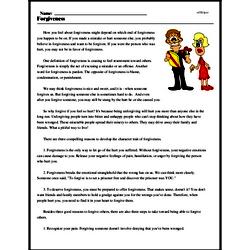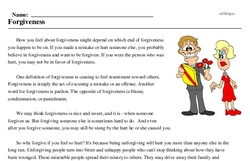Forgiveness
How you feel about forgiveness might depend on which end of forgiveness you happen to be on. If you made a mistake or hurt someone else, you probably believe in forgiveness and want to be forgiven. If you were the person who was hurt, you may not be in favor of forgiveness.
One definition of forgiveness is ceasing to feel resentment toward others. Forgiveness is simply the act of excusing a mistake or an offense. Another word for forgiveness is pardon. The opposite of forgiveness is blame, condemnation, or punishment.
We may think forgiveness is nice and sweet, and it is - when someone forgives us. But forgiving someone else is sometimes hard to do. And even after you forgive someone, you may still be stung by the hurt he or she caused you.
So why forgive if you feel so hurt? It's because being unforgiving will hurt you more than anyone else in the long run. Unforgiving people turn into bitter and unhappy people who can't stop thinking about how they have been wronged. These miserable people spread their misery to others. They may drive away their family and friends. What a pitiful way to live!
There are three compelling reasons to develop the character trait of forgiveness.




